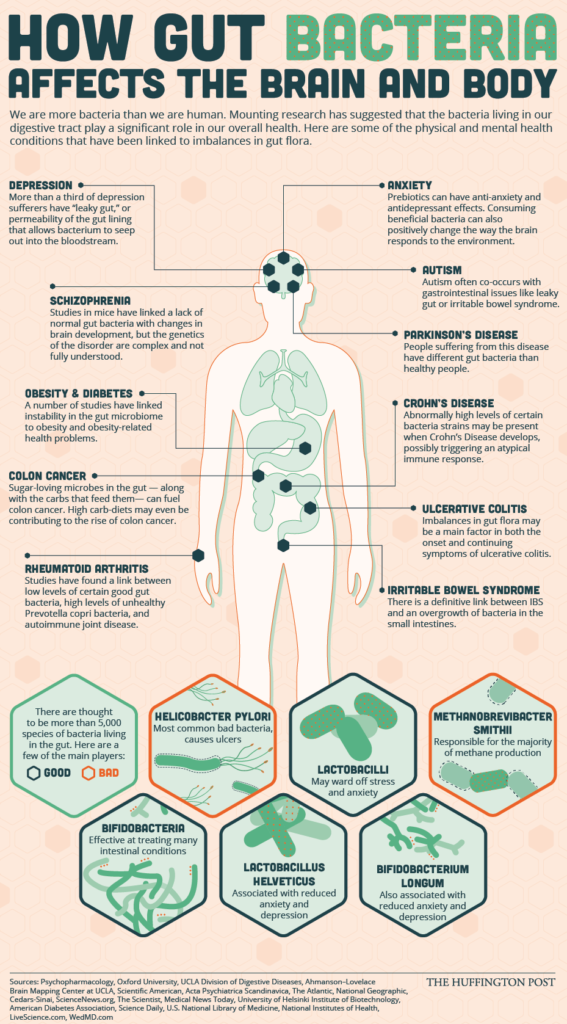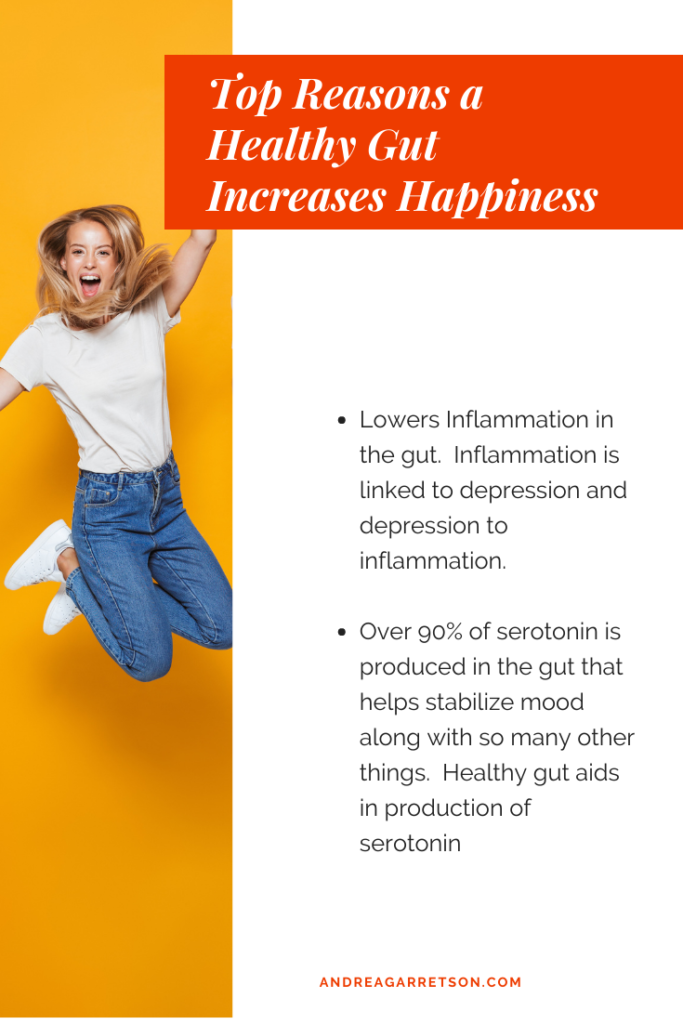As I have been on a journey of healing, I have been working to heal multiple areas of my life. I am really focused on a healthy gut.
The one thing that I have recently realized is that the gut brain connection is powerful. The gut handles so much that happens in the body, but today I want to focus on the gut brain connection. As someone that has suffered from anxiety since childhood, I am intrigued in the connection between the brain and the gut.
We have heard often that the gut produces approximately 90 percent of the serotonin. Now if you didn’t know, serotonin is the key hormone that stabilizes our mood, feelings of well-being, and happiness. This hormone impacts your entire body. It enables brain cells and other nervous system cells to communicate with each other. Serotonin also helps with sleeping, eating, and digestion.
Serotonin Production
Realizing the major production happens in the gut, so what does that mean when the gut is not in prime condition to produce the serotonin. That took me on a journey of research.
While it is not completely clear the connection between the gut and the brain. Scientists know that there is a powerful connection. The vagus nerve is basically the superhighway of communications for the central nervous system. It runs through the lungs, heart, spleen, liver, kidneys, and down to the intestines. The signals are almost instantaneous between the brain and the gut.
Ever felt butterflies or felt nauseated when you were nervous? That is thanks to that connection that is conveyed through the vagus nerve. So there really is something to having a gut feeling about something. It is the communication from the brain to the gut.
Gut Microbiome
Here is where it really gets interesting to me, the gut is composed of the microbiome. This microbiome is composed of millions of bacteria… some good and some bad. They all serve a purpose in the gut. This microbiome weighs approximately 4 pounds, making it heavier than the brain.

Certain bacteria in the gut affect different things in the body. The more diverse the bacteria is in the gut, the healthier the gut is. When the gut lacks the diversity of bacteria, dysbiosis occurs. When dysbiosis occurs, there are microorganisms in the gut that kinda hang out until this occurs, and then they multiply at a rapid speed, causing the immune system to be activated. The activation of the immune system causes inflammation. Interestingly enough, inflammation can cause depression and depression can cause inflammation.
So I want to focus most in this post on occurrences in the gut that could lead to mood disorders such as anxiety and depression. Serotonin is made from the essential amino acid tryptophan. This amino acid must enter your body through your diet and is commonly found in foods such as nuts, cheese, and red meat. Tryptophan deficiency can lead to lower serotonin levels. This can cause mood disorders, such as anxiety or depression.

Serotonin Functions
Get this, serotonin affects every part of the body… from your emotions to your motor skills. Obviously, I have known that it affects your emotions, as I have been on medication for several years to increase the serotonin levels. I was not aware that it affects so many other areas of the body. According to Healthline, it also helps:
- reduce depression
- regulate anxiety
- heal wounds
- stimulate nausea
- maintain bone health
Here’s how serotonin acts in various functions across your body:
Bowel movements: Serotonin is found primarily in the body’s stomach and intestines. It helps control your bowel movements and function.
Mood: Serotonin in the brain is thought to regulate anxiety, happiness, and mood. Low levels of the chemical have been linked with depression.
Nausea: Serotonin is part of the reason you become nauseated. Production of serotonin rises to push out noxious or upsetting food more quickly in diarrhea. The chemical also increases in the blood, which stimulates the part of the brain that controls nausea.
Sleep: This chemical stimulates the parts of the brain that control sleep and waking. Whether you sleep or wake depends on what area is stimulated and which serotonin receptor is used.
Blood clotting: Blood platelets release serotonin to help heal wounds. The serotonin causes tiny arteries to narrow, helping form blood clots.
Bone health: Serotonin plays a role in bone health. Significantly high levels of serotonin in the bones can lead to osteoporosis, which makes the bones weaker.
Sexual function: Low levels of serotonin are associated with increased libido, while increased serotonin levels are associated with reduced libido.
As someone that has suffered from digestive issues since childhood, I found this so interesting that I wanted to dig in and find out just how all of this was connected.
Healthy Gut-Brain Axis
We have determined the direct connection between the gut and the brain, so the connection between the two organs means that the gut-brain axis is becoming a vital player in mental health, illnesses that affect the brain, and even irritable bowel syndrome (IBS). Wowzers!
We know that low serotonin and inflammation can cause mood disorders. Both are linked back to the gut biome. You can help control these two things with a proper diet, but face it, you are eating the Standard American Diet, and you are probably not eating enough fiber. There is a short-chain fatty acid in the gut called Butyrate that is produced by the good bacteria in the gut when it breaks down the fiber. The Butyrate is used to fuel the cells in the gut lining. It helps keep the gut lining strong and intact. It also helps prevent inflammation, which was already discussed can lead to depression. So Butyrate is essential to have a properly functioning gut and lower the inflammation in the gut that can lead to depression and other symptoms such as constipation and fatigue.
Who is reading this and eats enough fiber in their diets? Total dietary fiber intake should be 25 to 30 grams a day from food, not supplements. Currently, dietary fiber intakes among adults in the United States average about 15 grams a day. Chances are, you are just like me in that statistic.
After realizing that I had a gut full of inflammation and 19 food sensitivities, I went looking for a solution after changing my diet drastically and that was not sustainable for me. I found a triad of products that work on the gut which will help with some other symptoms I have going on like inflammation, depression/anxiety, joint aches, fatigue, and weight gain.
Accelerated Results
This triad that I found contains a direct source of the butyrate that will aid in fueling and maintaining the health of the cells of the gut lining. While making some changes to my diet to maximize results, I can work to heal the gut without it only being focused on a strict diet. Read more about daily lifestyle changes.
After a month on the triad, I have lost a little of 13 inches, sleeping much better, less joint aches, a more stable mood with lessened anxiety and depression, and an increase of energy.
I still believe that the food that we put into our bodies is important, but it will take time to heal a gut if you only are focused on your diet like I was. This triad is a little boost to gut healing, resulting in better assumption of the nutrients from the foods that you are eating.
If you would like to join a Facebook group that focuses on the Triad and the health benefits, click here to join and be sure to list Andrea Garretson as the one that invited you in the questions to be admitted.
Thirty years of symptoms could have been reduced by focusing on the health of my gut is disappointing as a patient that has entrusted the medical community to guide my medical journey. I am a firm believer in being our own health advocate, and sometimes that requires non-traditional means.
Disclosure: Some of the links in this post are “affiliate links.” This means we may garner a small commission at no cost to you if you choose to make a purchase. I am not an affiliate of any product or service that I do not trust for use in my business or on my own websites. If I don’t use it, I do not promote it. This is the only way I can jury product quality, service and support levels, which are so important to those who trust my recommendations.
